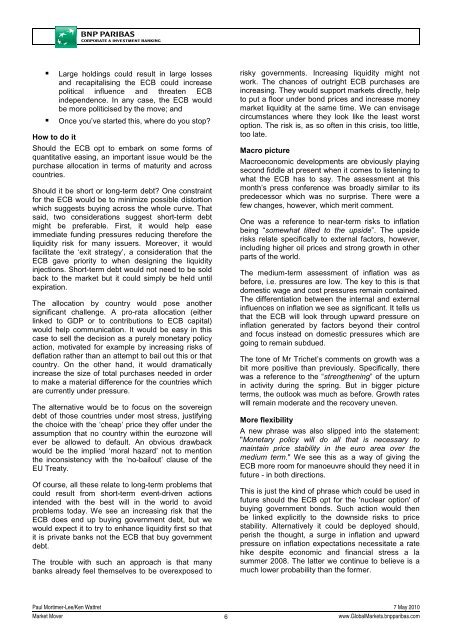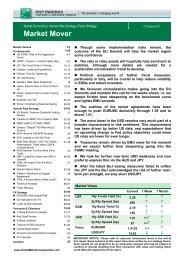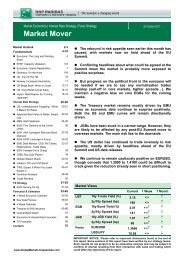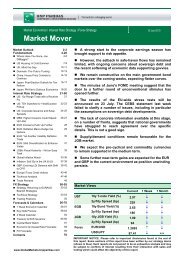Market Economics | Interest Rate Strategy - BNP PARIBAS ...
Market Economics | Interest Rate Strategy - BNP PARIBAS ...
Market Economics | Interest Rate Strategy - BNP PARIBAS ...
You also want an ePaper? Increase the reach of your titles
YUMPU automatically turns print PDFs into web optimized ePapers that Google loves.
• Large holdings could result in large losses<br />
and recapitalising the ECB could increase<br />
political influence and threaten ECB<br />
independence. In any case, the ECB would<br />
be more politicised by the move; and<br />
• Once you’ve started this, where do you stop?<br />
How to do it<br />
Should the ECB opt to embark on some forms of<br />
quantitative easing, an important issue would be the<br />
purchase allocation in terms of maturity and across<br />
countries.<br />
Should it be short or long-term debt? One constraint<br />
for the ECB would be to minimize possible distortion<br />
which suggests buying across the whole curve. That<br />
said, two considerations suggest short-term debt<br />
might be preferable. First, it would help ease<br />
immediate funding pressures reducing therefore the<br />
liquidity risk for many issuers. Moreover, it would<br />
facilitate the ‘exit strategy’, a consideration that the<br />
ECB gave priority to when designing the liquidity<br />
injections. Short-term debt would not need to be sold<br />
back to the market but it could simply be held until<br />
expiration.<br />
The allocation by country would pose another<br />
significant challenge. A pro-rata allocation (either<br />
linked to GDP or to contributions to ECB capital)<br />
would help communication. It would be easy in this<br />
case to sell the decision as a purely monetary policy<br />
action, motivated for example by increasing risks of<br />
deflation rather than an attempt to bail out this or that<br />
country. On the other hand, it would dramatically<br />
increase the size of total purchases needed in order<br />
to make a material difference for the countries which<br />
are currently under pressure.<br />
The alternative would be to focus on the sovereign<br />
debt of those countries under most stress, justifying<br />
the choice with the ‘cheap’ price they offer under the<br />
assumption that no country within the eurozone will<br />
ever be allowed to default. An obvious drawback<br />
would be the implied ‘moral hazard’ not to mention<br />
the inconsistency with the ‘no-bailout’ clause of the<br />
EU Treaty.<br />
Of course, all these relate to long-term problems that<br />
could result from short-term event-driven actions<br />
intended with the best will in the world to avoid<br />
problems today. We see an increasing risk that the<br />
ECB does end up buying government debt, but we<br />
would expect it to try to enhance liquidity first so that<br />
it is private banks not the ECB that buy government<br />
debt.<br />
The trouble with such an approach is that many<br />
banks already feel themselves to be overexposed to<br />
risky governments. Increasing liquidity might not<br />
work. The chances of outright ECB purchases are<br />
increasing. They would support markets directly, help<br />
to put a floor under bond prices and increase money<br />
market liquidity at the same time. We can envisage<br />
circumstances where they look like the least worst<br />
option. The risk is, as so often in this crisis, too little,<br />
too late.<br />
Macro picture<br />
Macroeconomic developments are obviously playing<br />
second fiddle at present when it comes to listening to<br />
what the ECB has to say. The assessment at this<br />
month’s press conference was broadly similar to its<br />
predecessor which was no surprise. There were a<br />
few changes, however, which merit comment.<br />
One was a reference to near-term risks to inflation<br />
being “somewhat tilted to the upside”. The upside<br />
risks relate specifically to external factors, however,<br />
including higher oil prices and strong growth in other<br />
parts of the world.<br />
The medium-term assessment of inflation was as<br />
before, i.e. pressures are low. The key to this is that<br />
domestic wage and cost pressures remain contained.<br />
The differentiation between the internal and external<br />
influences on inflation we see as significant. It tells us<br />
that the ECB will look through upward pressure on<br />
inflation generated by factors beyond their control<br />
and focus instead on domestic pressures which are<br />
going to remain subdued.<br />
The tone of Mr Trichet’s comments on growth was a<br />
bit more positive than previously. Specifically, there<br />
was a reference to the “strengthening” of the upturn<br />
in activity during the spring. But in bigger picture<br />
terms, the outlook was much as before. Growth rates<br />
will remain moderate and the recovery uneven.<br />
More flexibility<br />
A new phrase was also slipped into the statement:<br />
"Monetary policy will do all that is necessary to<br />
maintain price stability in the euro area over the<br />
medium term." We see this as a way of giving the<br />
ECB more room for manoeuvre should they need it in<br />
future - in both directions.<br />
This is just the kind of phrase which could be used in<br />
future should the ECB opt for the 'nuclear option' of<br />
buying government bonds. Such action would then<br />
be linked explicitly to the downside risks to price<br />
stability. Alternatively it could be deployed should,<br />
perish the thought, a surge in inflation and upward<br />
pressure on inflation expectations necessitate a rate<br />
hike despite economic and financial stress a la<br />
summer 2008. The latter we continue to believe is a<br />
much lower probability than the former.<br />
Paul Mortimer-Lee/Ken Wattret 7 May 2010<br />
<strong>Market</strong> Mover<br />
6<br />
www.Global<strong>Market</strong>s.bnpparibas.com
















